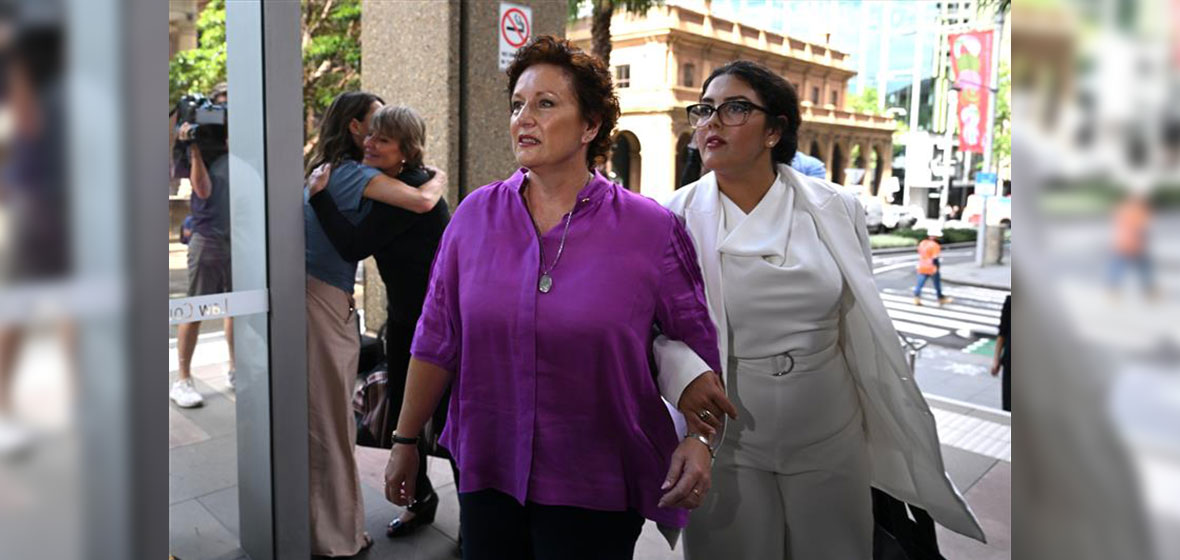Does the pardoning of Kathleen Folbigg over the deaths of her four children demonstrate the need for an independent case review commission?
Once labelled “Australia’s worst female serial killer”, Kathleen Folbigg was pardoned in 2023 after serving 20 years in prison for the deaths of her four children.1 The pardon was granted following a second judicial inquiry where fresh scientific evidence on genetic mutations supported a reasonable doubt that her children may have died of natural causes. The overturning of Kathleen Folbigg’s convictions signified a poignant reminder that criminal courts, like all human institutions, are not infallible and robust review mechanisms are an essential part of our justice system.
The High Court of Australia ruled that there is a ‘searing injustice and consequential social injury … when the law turns upon itself and convicts an innocent person’.2 Recent studies on wrongful convictions have identified the most common causal factors to be inaccurate DNA and scientific evidence, unreliable eyewitness testimonies, police misconduct, tunnel-vision prosecutions and false confessions.3 These causal factors are further compounded by racial and socio-economic inequalities.4
Former High Court Justice Michael Kirby commented ‘there is a need in Australia, for greater concern and vigilance about the risk of miscarriages of justice’ and that the establishment of an independent case review commission could potentially address an ‘institutional defect’ of post-conviction remedies in Australia.5 In light of these comments, this article will examine the Criminal Cases Review Commission (CRCC) in the United Kingdom and consider the case for an independent body to review criminal convictions in NSW.
The NSW Landscape of Post-Conviction Review
Current avenues for post-conviction review in NSW include appealing to a higher court, seeking an inquiry, review or pardon under Part 7 of the Crimes (Appeal and Review) Act 2001 (CAR Act) and petitioning the Governor to exercise the Royal prerogative of mercy.
A convicted person has a right to appeal on a question of law or may seek leave to appeal on an issue involving a question of fact.6 Appeals must be filed within statutory time limits and fresh evidence can only be admitted under limited circumstances to avoid a miscarriage of justice.7 Underpinned by the principle of finality, constraints in the appellate process provide a necessary degree of closure to victims, stakeholders and the legal system.8 However these limitations present challenges for defendants who lack the ability to articulate or establish their grounds of appeal, particularly factual errors such as inaccurate DNA evidence.9 The High Court noted in Burrell v The Queen that ‘[l]ater correction of error is not always possible. If it is possible, it is often difficult and time-consuming, and it is almost always costly’.10
When avenues of appeal have been exhausted, a convicted person may petition the Governor for a pardon or conviction review or apply to the Supreme Court for an inquiry under Part 7 of the CAR Act.11 Judicial inquiries are an important avenue for reviewing the safety of a conviction and are granted in exceptional circumstances where there is a question or doubt as to guilt and there is fresh and compelling evidence that was not available at the trial or appeal.
The Royal prerogative of mercy is considered a final resort when avenues of appeal and review have been exhausted. It is a discretionary power exercisable by the Governor on advice of the Executive Council to relieve the effects of a conviction without quashing the conviction itself.12 The prerogative of mercy serves a unique and necessary function to ‘achieve the aims of the criminal justice system by tempering justice with mercy’.13 However a petitioner must demonstrate rare and exceptional circumstances14 to justify executive interference with a judicial decision. Between 2020 and 2024, only 4 out of 44 petitions for the exercise of the Royal prerogative of mercy were granted.15
There have been calls for greater accountability and accessibility in the post-appeal review process. Lingard comments that executive decisions to grant a pardon or conviction review risk being influenced by political or public pressures, potentially limiting relief to cases that attract media or public sympathy.16 In considering a Commonwealth CRCC, the Law Council of Australia noted that the entire burden, including the financial cost, of identifying, locating, obtaining and analysing further evidence rests entirely with the convicted person who has no power to compel the production of information, interview witnesses or conduct scientific testing.17 Consequently, access to post-conviction remedies are limited to those who have the necessary resources, representation or public attention to obtain exculpatory evidence and instigate a review or pardon.
Lessons from the UK Criminal Cases Review Commission
The CRCC was established under the Criminal Appeal Act 1995 as an independent body with powers to investigate miscarriages of justice. The CRCC can refer cases back to the Court of Appeal upon a finding that there is a ‘real possibility that the conviction, verdict, finding or sentence would not be upheld were the reference to be made’.18 The CRCC does not have the power to quash a conviction, but carries the mandate to investigate and refer appropriate cases to an appellate court. Between April 1997 and June 2025, the CRCC has received 33,559 applications, referred 876 cases to an appeal court resulting in 595 (68%) successful appeals.19
The merit of the CCRC model lies in its independence and accessibility. The CRCC’s statutory powers to obtain evidence and investigate miscarriages of justice on behalf of an applicant provides a more systematised pathway for conviction review. Recently in May 2025, the murder conviction of Peter Sullivan was overturned after serving 38 years in custody, making his case the longest miscarriage of justice in the UK.20 In 2021, the CRCC advocated for the retesting of crime scene samples due to advances in forensic technology. The further tests provided important exculpatory evidence for Mr Sullivan, revealing that his DNA was not present in the samples taken from the crime scene and contained the genetic markers of an unknown DNA profile.
In the case of Andrew Malkinson, the CRCC was heavily criticised due to failures to properly investigate the matter and two prior refusals to refer his case to the Court of Appeal despite the availability of exonerating evidence. In 2023, Mr Malkinson’s rape convictions and sentence of life imprisonment were quashed on grounds relating to new DNA evidence and undisclosed material recovered from police files. An independent review into the handling of Mr Malkinson’s case led by Chris Henley KC found that Mr Malkinson could have been exonerated almost a decade earlier had the CRCC properly investigated the forensic evidence.21 These failings led to the resignation of the CRCC Chair in 2025 and a House of Commons Justice Committee Report concluding that the CRCC required urgent “root and branch” reform.22
The Westminster Commission on Miscarriages of Justice further found that, while the CRCC had conducted “some excellent investigative work”, the “financial constraints and an increased caseload have compromised the CCRC’s ability to carry out its role effectively in all cases”.23 There are also concerns that the ‘real possibility test’ under the Criminal Appeal Act 1995 lacks sufficient clarity with the Henley Report recommending that ‘The question should always be ‘might this be a miscarriage case’ rather than an exercise in thinking of reasons why the Court of Appeal might reject the referral’.24 An interim CRCC Chair is currently undertaking a comprehensive review of the organisation’s governance, culture, performance and resourcing, suggesting that reforms to the Commission are on the horizon.
Conclusion
The UK experience reveals both the promise and pitfalls of a Criminal Cases Review Commission. At its highest, the CCRC provides an accessible and independent safeguard against miscarriages of justice, contributing to the overturning of hundreds of wrongful convictions and uncovering systemic failures within the justice system. The Commission’s statutory powers to investigate, compel evidence and refer appropriate cases to appellate courts provides a valuable avenue of review that could enhance the current framework of post-conviction remedies in NSW.
Recent concerns surrounding resource constraints, caseloads, governance issues and the referral test highlight the practical challenges of the UK CRCC. However these issues do not diminish the value of the CCRC but emphasise the need for any NSW equivalent to be adequately resourced, clearly mandated and carefully adapted to domestic laws and institutions. If designed with independence, transparency and resourcing at its core, a criminal case review commission in NSW has the potential to provide an additional pathway to justice for wrongfully convicted defendants. Further research and policy discussion on the adequacy of post-conviction remedies in NSW remains imperative as these safeguards are not only a matter of individual justice, but a cornerstone of public confidence in the rule of law.
[1] NSW Department of Communities and Justice, ‘Kathleen Folbigg Pardoned’, NSW Government (5 June 2023) <https://dcj.nsw.gov.au/news-and-media/media-releases/2023/kathleen-folbigg-pardoned.html>.
[2] Van Der Meer v R [1988] HCA 56; (1998) 82 ALR 10; (1988) 62 ALJR 656 (2 November 1988).
[3] C Hoyle, Reasons to Doubt: Wrongful Convictions and the Criminal Cases Review Commission (Oxford University Press, 2019).
[4] K Roach, ‘The Wrongful Conviction of Indigenous People in Australia and Canada’ (2015) 17 Flinders Law Journal 203.
[5] M Kirby, ‘Miscarriages of Justice in Australia: Unfinished Business’ (2021), 3. <https://www.michaelkirby.com.au/sites/default/files/speeches/3083%20-%20ARTICLE%20-%20MISCARRIAGES%20OF%20JUSTICE%20-%20UNFINISHED%20BUSINESS.pdf> .
[6] Criminal Appeal Act 1912 (NSW), s 5.
[7] Betts v The Qeen (2016) 258 CLR 420 at [2], [10].
[8] D Hamer, ‘The Eastman Case: Implications for an Australian Criminal Cases Review Commission’ (2015) 17(2) Flinders Law Journal 433 – 469.
[9] L Weathered, ‘Pardon Me: Current Avenues for the Correction of Wrongful Conviction in Australia’ (2005) 17(2) Current Issues in Criminal Justice 203, 207.
[10] Burrell v The Queen [2008] HCA 34, [16].
[11] Crimes (Appeal and Review) Act, ss 76-79.
[12] Crimes (Appeal and Review) Act, s 114.
[13] C Greentree, ‘Retaining the Royal Prerogative of Mercy in NSW’ (2019) UNSW Law Journal 46.
[14] NSW Government (2022) ‘Royal prerogative of mercy: fact sheet’. <https://dcj.nsw.gov.au/documents/legal-and-justice/royal-prerogative-of-mercy/royal-prerogative-mercy-fact-sheet.pdf >
[15] NSW Government (2024) ‘The Royal prerogative of mercy and reviews of convictions and sentences’
<https://dcj.nsw.gov.au/legal-and-justice/laws-and-legislation/royal-prerogative-of-mercy-and-reviews-of-convictions-sentences/release-of-information.html>
[16] K Lingard (2024) ‘Accessing Justice after Conviction: A Review of the Crimes (Appeal and Review) Act 2001 (NSW) Part 7 Division 3’, UNSW Law Journal, 47(3), 885-886.
[17] Law Council of Australia (2012) Policy Statement on a Commonwealth Criminal Cases Review Commission, 21 April 2012. < https://lawcouncil.au/publicassets/0e6c7bd7-e1d6-e611-80d2-005056be66b1/120421-Policy-Statement-Commonwealth-Criminal-Cases-Review-Comission.pdf>.
[18] Criminal Appeal Act 1995 (UK), s 13.
[19] Criminal Case Review Commission (2024) ‘Facts and Figures’ < https://ccrc.gov.uk/facts-figures/>.
[20] BBC News (13 May 2025) ‘Man jailed for 1986 murder acquitted after 38 years’.
<https://www.bbc.com/news/articles/ce809e3gd1xo>.
[21] Criminal Case Review Commission (2024) ‘Independent review by Chris Henley KC of the CRCC’s handling of the Andrew Malkinson case’.
[22] House of Commons Justice Committee (2025) ‘Leadership of the Criminal Cases Review Commission’, Third Report of Session 2024 – 25 (HC 749). <https://committees.parliament.uk/publications/48089/documents/251384/default/>.
[23] Westminster Commission on Miscarriages of Justice (2021) ‘In the interests of justice: An inquiry into the Criminal Case Review Commission’, All-party Parliamentary Group on Miscarriages of Justice, 7.
[24] Criminal Case Review Commission (2024) above n. 21, 102-103.
Deborah White is a Solicitor Advocate at the NSW Department of Communities and Justice and was the winner of the John Hennessy Legal Scholarship 2024.




